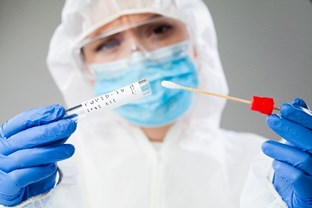 With Covid-19 cases holding firm in many parts of the UK, it’s no surprise that some businesses and individuals are taking testing matters into their own hands.
With Covid-19 cases holding firm in many parts of the UK, it’s no surprise that some businesses and individuals are taking testing matters into their own hands.
While NHS tests are rightly reserved for those who have Covid symptoms – the main ones being a new and continuous cough, a loss of taste or smell, or a high temperature – private antigen testing, which detects if you currently are positive for SARS-CoV-2, the virus that leads to Covid-19, is also available.
This provides a safety net for those who are concerned they have been exposed to someone with the virus or who have been away to a high-risk location. They are also providing invaluable to some businesses that want to provide regular testing for staff to help minimise risks within the workforce and even television companies that want to keep their crews and cast safe.
There are clear advantages to providing regular testing, but it is essential that any kits you order are CE marked because these are the only ones that meet the Government’s stringent quality standards.
There could be other reasons why you want to have peace of mind and order a test: as we face the end of the autumn university term and students head back to home for the Christmas break this month (December 2020), ordering a PCR swab kit on their return to the household could help to provide additional peace of mind for families during the festive season.
 Over the past few months, we have seen a growing number of organisations requesting these tests and we even managed the Covid testing programme for INEOS TEAM UK as part of their preparations to travel to New Zealand to compete in the forthcoming America’s Cup, racing in a yacht that was assisted in the design by the Mercedes AMG Formula 1 Team.
Over the past few months, we have seen a growing number of organisations requesting these tests and we even managed the Covid testing programme for INEOS TEAM UK as part of their preparations to travel to New Zealand to compete in the forthcoming America’s Cup, racing in a yacht that was assisted in the design by the Mercedes AMG Formula 1 Team.
So, what does each test do?
Covid-19 home tests
If you are ineligible for an NHS antigen (Covid-19) test, it is possible to order a private polymerase chain reaction (PCR) swab test to carry out in your own home.
These antigen swab tests are exactly the same as those used by the NHS and they can detect if you have SARS-CoV-2, the virus that leads to Covid-19, if you have symptoms or if you were in contact with someone between one and five days prior who has tested positive.
While the test will pick up if you are positive or negative at the time, it is important to remember that it could take up to two weeks for you to display symptoms.
The swab test involves taking a single combined swab of your mouth and then your nose. It works by detecting RNA (ribonucleic acid), which provides the genetic information of the virus to establish if someone has the virus, even very early on in the infection stage.
The good news is that these tests are very accurate, too. The PCR swab assays we use are from The Doctors Laboratory, which is the largest independent provider of clinical laboratory diagnostic services in the UK and which also supplies the NHS. They have a minimum sensitivity of 98%, which means the rate for detecting an individual as having the virus is extremely high. This results in very few false positives. They also have a specificity of 100%, which means all individuals without the virus are correctly identified as being healthy.
Antibody tests
Antibody tests are designed to tell you if you have had Covid-19 – not if you are currently infected.
These simple-to-use CE-marked tests are different from the antigen tests as they require a small sample of blood, produced by using a sterile lancet that is supplied in the testing kit.
The lancet is used to prick the side of your middle or ring finger and then a small amount of blood is deposited into the collection tube.
We supply the Roche Diagnostics Elecsys Anti-SARS-CoV-2 assay, which is approved by the Medicines and Healthcare products Regulations Authority (MHRA) and is UKAS (ISO15189) accredited.
It is a tried and tested procedure, with a minimum sensitivity of 97.4% and a specificity of 100% and has been evaluated as a total antibody assay that will detect both IgG and IgM antibodies.
Immunoglobulin G (IgG) antibodies are the most common and are found in the blood and body fluids. They protect against both bacterial and viral infections. Immunoglobulin M (IgM) antibodies are mainly located in the blood and lymph fluid and are the first antibodies the body makes when it is fighting a new infection.
It is important to note that you should not consider having an antibody test until 14 days after exposure to someone with Covid-19 or onset of symptoms of the virus. This is because the body will not have developed sufficient antibodies to be detected by the test.
However, if you believe you may have had the virus but not developed any symptoms (ie, you were asymptomatic) in the past few months, the antibody test may well be suitable.
If your test comes back positive for antibodies, it means you have had Covid-19. However, because little is understood about our immune response to SARS-CoV-2, it is not safe to assume you are fully or partially immune from future infection because it is not yet known how long immunity can last.
It is crucial, therefore, that you continue to follow the Government’s social distancing guidelines.
Want to order a test?
Order a PCR test or antibody test between Monday and Friday before 4pm, you will receive it the next working day via courier (you can upgrade the delivery option if ordering on a Friday to ensure Saturday delivery). Once you have completed the PCR swab test, place the sample in the pre-paid envelope and post it in a priority postbox. Blood samples can be posted in any post box. You will receive the results of the PCR test between 48 and 72 hours after the lab has taken delivery of the sample and between 24-48 hours for the antibody test.
You can find out more about our antigen PCR tests and antibody tests, but if you have any queries or need to speak to us about bulk ordering swab test kits for your business, sports team or organisation, you can contact us at: team@webmedpharmacy.co.uk or by phone on: 0161 491 1899. We’re open Monday-Friday, 9am-5pm.
Written by: Jayne Howarth, November 27th 2020.